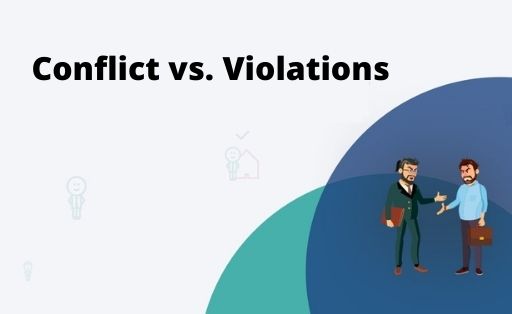Conflict is something that can be found in all types of relationships. Conflict itself is not a bad thing; it’s how you handle the conflict that determines whether or not you are successful at resolving it. However, when there are violations within your relationship, these are things that should never happen. They are destructive to the relationship and will most likely result in tension between each party involved. Below we will explore some differences between SoD conflicts and SoD violations, so you know what to expect from each situation.

What is the Difference between an SoD Violation and an SoD Conflict?
An SoD violation is an action that goes against your company’s values and should never happen. These can be anything from talking poorly about a colleague behind their back to leaking business information to the competition. If something like this happens within your organization, you need to ensure it doesn’t continue by having strong consequences for those who violate these rules.
Violations are often associated with distractions in the workplace as well as unprofessionalism. When gossip or other issues arise, they create tension between colleagues and ultimately affect productivity because employees may spend time bickering rather than getting work done! This will also lower morale since staff members feel uncomfortable when unresolved conflict is present at the office.
What Happens when there are Violations?
SoD violations often stem from unresolved conflicts between co-workers because this creates tension among employees who don’t like each other. When these violations occur, it means that someone has broken your company’s trust and violated one of its SoD rules. These are dealt with formally since they have the potential to ruin business relationships if not handled properly.
Conflicts can be seen as minor disagreements between employees but ultimately need to be resolved, so everyone feels comfortable around each other again! This may come from talking about what happened or coming up with solutions to prevent this situation from happening again in the future. Once you bring back peace within your organization by resolving any issues among co-workers, productivity will increase, which is good for profitability!
So When Should I Handle Conflicts vs. Violations?
Handling conflict situations properly will ensure your business is productive and that employees are happy! These should be taken care of as soon as they arise, so everyone feels comfortable around each other again. While conflicts may seem like a distraction, it’s better to resolve these quickly since this creates peace within the office environment, resulting in higher productivity levels overall.
However, when violations occur, you need to have more formal consequences for those who violate SoD rules because these can damage company relationships if not dealt with properly. When someone violates an important rule such as sharing confidential information or abusing their position at work by bullying others, there need to be serious actions taken against them, so this doesn’t happen again. Once all violations have been resolved and handled formally through HR procedures, productivity levels will increase again.
To prevent SoD conflicts and violations, ensure you have regular team meetings to resolve any issues before they get out of hand! This will help your employees feel comfortable around each other again. Plus, working together to solve conflicts and prevent SoD rules from being broken in the future ensures everyone is happy with their work environment once more.
Last Words
The key to understanding the differences between these two concepts is their definitions. Conflict deals with disagreements and challenges among individuals, groups, or countries over time, while violations tend to be specific events. For example, a conflict might be an argument about where you want to go for dinner tonight, whereas a violation would be when someone steals your car keys from your purse without permission. Understanding what they are can help us deal with them more effectively!
